Welcome back to This Week in Apps, the TechCrunch series that recaps the latest OS news, the applications they support and the money that flows through it all.
The app industry is as hot as ever, with a record 204 billion downloads and $120 billion in consumer spending in 2019. People are now spending three hours and 40 minutes per day using apps, rivaling TV. Apps aren’t just a way to pass idle hours — they’re a big business. In 2019, mobile-first companies had a combined $544 billion valuation, 6.5x higher than those without a mobile focus.
Top Stories
Apps and the Elections
The tight, nail-biting U.S. elections this week had a number of impacts on the app market.
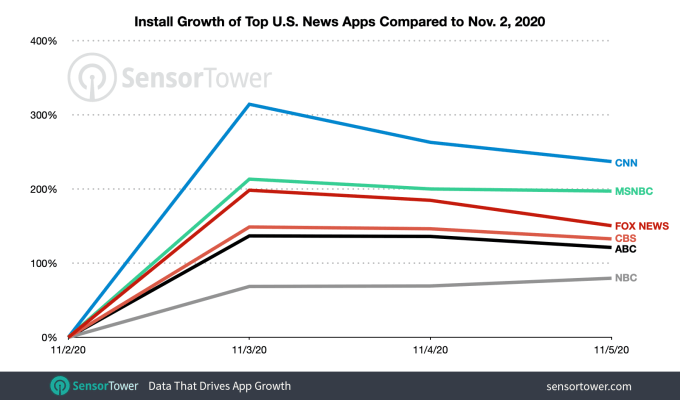
Image Credits: Sensor Tower
The apps Americans chose to watch the elections on their iPhone were reflective of the nation’s divisions. Instead of a more neutral news source, like a broadcast network, the top 2 apps were CNN and Fox News — cable news channels that lean left and right, respectively.
On the day after Election Day, the Fox News app hit No. 2 among the top free iPhone apps on the U.S. App Store. This is the highest it has ever ranked. The second-highest ranking it reached was No. 9 on November 9, 2016.
Meanwhile, the CNN app hit No. 3 on the same — its highest rank since it hit No. 2 back on Jan. 20, 2017, the date of Trump’s inauguration. This was also the 3rd highest ever rank. (The app previously reached No, 1 on Nov. 9, 2016).
As of Nov. 5, CNN maintained a top ranking at No. 4 but Fox News slipped to No. 14.
Other news apps didn’t do as well, barely cracking the top 50 at best
Android users showed less interest in the elections, where Fox News only got as high as No. 12 on Nov. 5 and CNN reached No. 16.
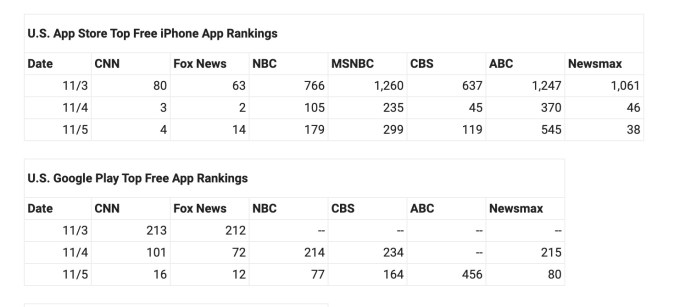
Image Credits: Sensor Tower
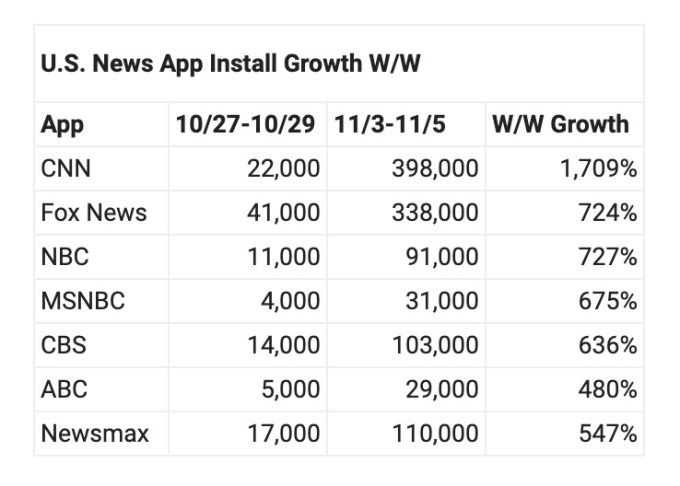
Image Credits: Sensor Tower
In lighter news from this stressful week, Calm’s meditation app made headlines for its hilarious ad campaign that saw it sponsoring CNN’s coverage of the presidential election. The app popped up on the screen during CNN’s “Key Race Alert.” The move seemed to benefit the app in terms of downloads and rankings.
On social media apps, companies had to react quickly to clamp down on the rapid-fire spread of misinformation and conspiracy theories, and other violating content. Facebook and Instagram ran notifications to inform users that votes were still being counted after Trump falsely claimed he had won.
Facebook also removed conspiracy groups and hashtags associated with election misinformation, as did TikTok. In Facebook’s case, a hashtag block is not a full removal — content will still be returned if you search for a blocked phrase, even if it’s largely from news organizations reporting on the trend. On TikTok, however, a blocked terms returns nothing. TikTok also took more decisive action to fully remove videos spreading election misinformation.
However, for those in the market for misinformation, it’s still fairly easy to find across TikTok, as many other hashtags and terms where misinfo is shared remained untouched.
YouTube, however, took a more controversial stance on its handling of misinformation. The platform this week demonstrated how it’s complicit in the spread of false and dangerous information, when it refused to remove a video that falsely claimed Trump won the election and worked to undermine Americans’ trust in democratic elections. YouTube believes demonetization and warning labels are the solution, but by keeping this content online, it retains users. And then those people do, in fact, watch ads elsewhere, allowing YouTube to profit.
The company did draw the line, at least, at a video from Steve Bannon, that called for violence against and deaths of Anthony Fauci and FBI director Christopher Wray.
According to Sensor Tower, the top social media apps in the U.S. including TikTok, Facebook, Instagram, Snapchat, and Twitter saw their combined iOS and Android installs from November 3 to November 5 decline 8% week-over-week when compared to the installs from October 27 to October 29.
Right-wing social app Parler, meanwhile, ranked at No. 1,023 on iOS on November 2. On November 5, it had climbed to No. 241. As of Friday, it was No. 29.
Apple rolls out a big update to iOS 14
Apple this week released iOS 14.2, which brings a number of new features in addition to the usual bug fixes and security updates.
Of note to consumers, the update brings 117 new emojis.
Among the new emoji is a tweaked version of the “Face with Medical Mask,” which changes the face so the eyes are smiling. Other notable additions include the transgender flag, pinched fingers, people hugging, a smiling face with tear, a man bottle-feeding a baby and a more inclusive set of tuxedo-wearing people and people wearing a veil. There’s also a gender-inclusive alternative to Santa and Mrs. Claus, which offers a gender neutral option of a person in a Santa hat.
The updated iOS also offers eight new wallpapers in both light and dark version; new AirPlay controls; the ability to connect the HomePod to Apple TV for stereo, surround sound and Dolby Atmos audio; support for iPhone 12 Leather Sleeve with MagSafe; optimized battery charging for AirPods; headphone audio level notifications; and more.
One of the more interesting new features, however, is an accessibility upgrade for blind users that takes advantage of the lidar support in iPhone 12, 12 Pro Max and iPad Pro.
The “People Detection” features leverages lidar to detect how close people are to the device owner, as a way to help blind users better navigate the world.
Get ready for Apple’s new “app privacy” labels
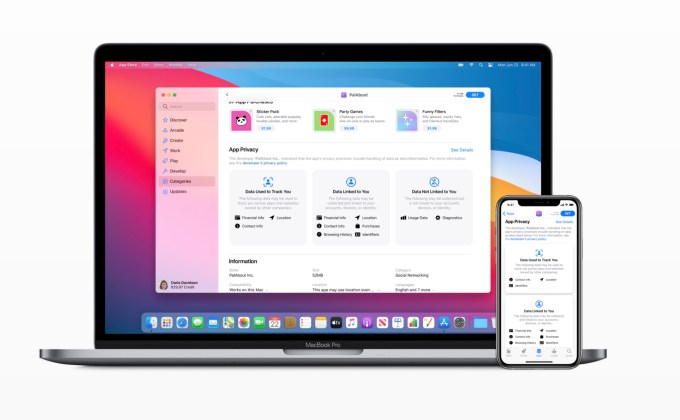
Image Credits: Apple
Apple this week announced a deadline of December 8, 2020 for app developers to submit their app’s privacy information to the App Store. This information will be required to submit new apps and app updates, and will give consumers a better understanding of how apps are accessing their data.
On each app’s product page following the deadline, users will be able to see what data an app collects and how that data is used to track them, Apple says. This doesn’t only include data the app developers collect themselves, but also data that’s transmitted off the device for later use by the developer or a third-party partner. That means app developers will have to disclose how data is being handed over to analytics tools, ad networks and other third-party SDKs and other vendors.
With this pro-consumer privacy change, Apple customers will know how developers are tracking and/or sharing their personal info, health data, financial information, location, contacts data, user content, browsing and search histories, purchases, app usage, diagnostic and more.
While it’s hard to argue that this is a change for the better, in terms of consumer benefits, Apple’s reasons may not be just about serving their customer base.
By cutting off the ad analytics industry with its upcoming crippling of IDFA and making it more obvious which apps track user data, Apple is putting its own ad tech in a more favored position. Its framework SKAdNetwork hugely benefits from these changes — effectively giving Apple a seat at the table in the multi-billion-dollar ad industry. So, let’s stop pretending this is all about how much Apple cares for its users. This is business.
Weekly News Round-Up
Platforms
- Fortnite finds a way to skirt App Store ban. The game, banned by Apple in a battle over App Store fees, may have another way to reach the iPhone user base by way of Nvidia’s GeForce cloud gaming service that runs on the mobile web.
- WhatsApp rolls out a payments service in India. The Facebook-owned messaging app began testing the service in 2018, but struggled to get government approval. The service, which is built on UPI, offers a challenge to Google and Walmart which currently dominate the mobile payments market in India.
- WhatsApp adds disappearing messages. The new ephemeral messages disappear after seven days and rolled out across iOS and Android. It also made it easier for users to delete large files and manage storage.
- Apple announces a new event. The expectation is that this one will be Mac-focused.
- Apple warns investors that reduced App Store revenues would hurt its financial results. The warning comes amidst increasing regulatory pressure on the App Store, which today requires developers to distribute through its platform to reach iOS users, and requires IAPs through Apple Pay.
Services
- Google Stadia, the cloud gaming service, rolls out Stadia Family Sharing. The feature lets families of up to six share games.
- All the U.K. contact tracing apps are now compatible and work across borders. The separate apps address England & Wales, Scotland and Northern Ireland markets, and use the Apple/Google API.
Politics
- PUBG Mobile plots a way to return to the Indian market, after a ban over cybersecurity concerns due to its connections with Chinese giant Tencent. The company is looking for a local publisher.
- Facebook and Instagram added notifications during the tight U.S. election this week to alert users that votes were still being counted. The move follows Trump’s spread of conspiracies that elections were rigged and his lies saying he had won before all votes had been counted.
Security & Privacy
- Google Screenwise is dead. The tracking app, which records users’ web usage, had been in the news last year for improperly using an iOS enterprise certificate for distribution.
Apps in the News
- Spotify adds standalone streaming support to its Apple Watch app. That means users can leave their iPhone behind and stream directly from their Watch over Wi-Fi or cellular.
- Facebook tests “dark mode” on Android. The new dark mode option had been tested earlier on desktop.
- Triller names Daniel Gillick its Global Head of Partnerships. The exec was previously senior manager of music content and industry relations at Triller rival TikTok.
- TikTok signed a new, longer-term agreement with Sony Music. The deal allows the app to continue to offer music from Sony artists in its app.
- TikTok tests iOS 14 “App Clips.” The test was spotted in beta, and would allow users a full-screen preview with a download prompt.
- NBC News launched an iOS 14 widget for putting election news and results on your home screen.
- Pokémon GO reaches $1 billion in 2020; lifetime revenue tops $4 billion, says Sensor Tower.
- Tencent claims record 100 million daily users on mobile game, Honor of Kings. The game consistently ranks among the world’s top-grossing games, as well.
- Match Group reported Tinder subscriber growth despite a pandemic where people are supposed to be social distancing. Tinder had 6.6 million subscribers in the quarter, up from 6.2 million in the prior quarter. Tinder revenue rose 15%, but ARPU slipped 1%.
Trends
- App Store revenue grew 30% year-over-year during the month of October, according to Sensor Tower preliminary data.
- Apple IAPs rose 54% during Q2 according to research from mCommerce agency JMango360.
- 56% of marketers said iOS 14 updates will negatively impact their businesses, due to how Apple’s new consumer privacy protections offer users more ways to block tracking.
- TikTok still tops worldwide downloads in October 2020.
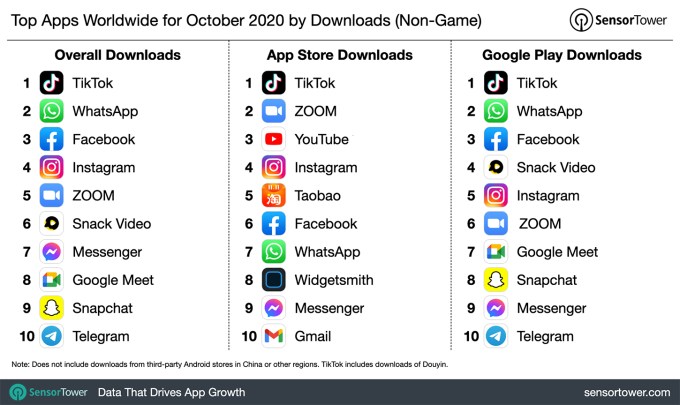
Image Credits: Sensor Tower
Funding and M&A (and IPOs)
- Delivery startup goPuff, whose app lets you order convenience store items and alcohol for same-day delivery, acquires alcoholic beverage chain BevMo for $350 million.
- TikTok parent company ByteDance looking to raise $2 billion before its IPO on the Hong Kong StockExchange.
- Kuaishou Technology, the world’s second-largest short term video app and TikTok rival, filed for IPO in Hong Kong.
- European challenger banking app Vivid Money raises $17.6 million. The bank offers a metal debit card controlled by an app, and other tech-forward features.
Downloads
The Roku Channel app
The recently released app lets anyone, including non-Roku users, stream from Roku’s catalog of free, live and premium movie and TV content on their iOS or Android device. The app also offers more than 115 live channels including live news, weather, sports, food & home, reality TV, science fiction, true crime, kids’ entertainment and Spanish language content.
The Collage Atlas
Looking to wind-down from a week of stress and anxiety? The Apple Arcade game, The Collage Atlas, may help. This unique hand-drawn game created by developer John William Evelyn is a work of art where players are invited to journey through a pen-and-ink dream world, accompanied by a soundtrack shaped by your gameplay. The title, which was in development for more than four years, is more of something to experience than something to more actively “play” — and that may be just what’s needed right now.

 Every new emoji in iOS 14.2
Every new emoji in iOS 14.2 
